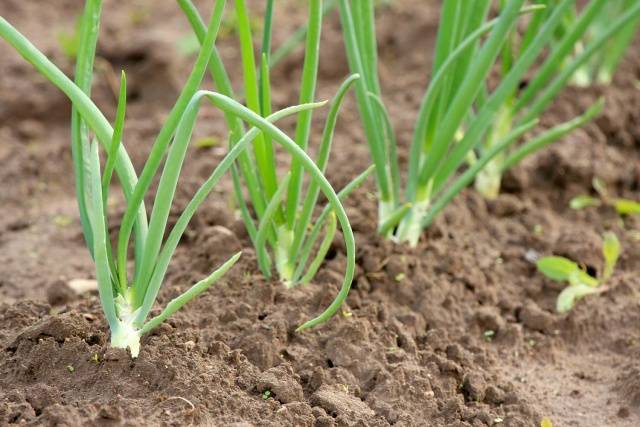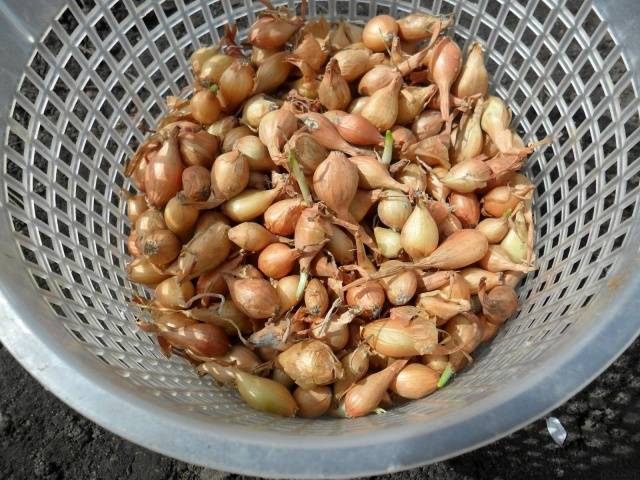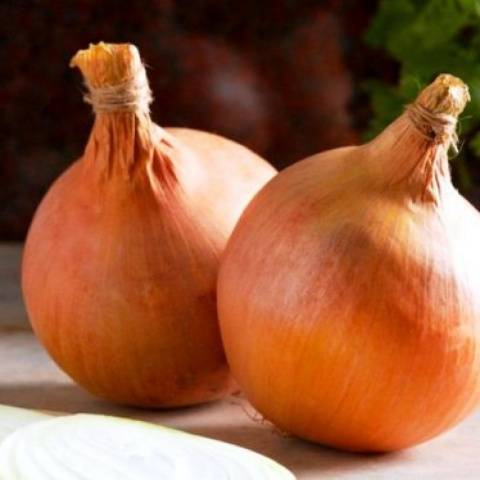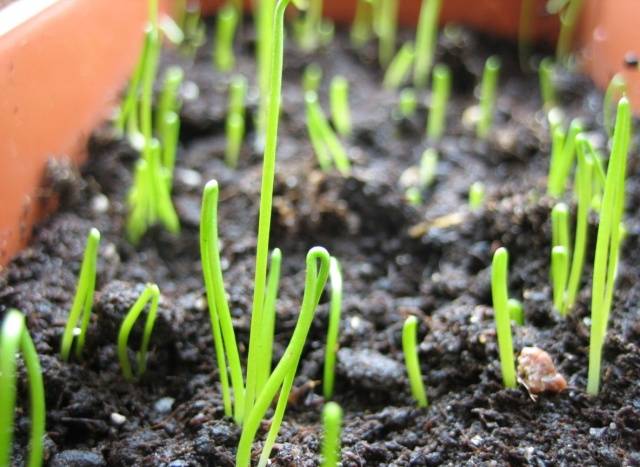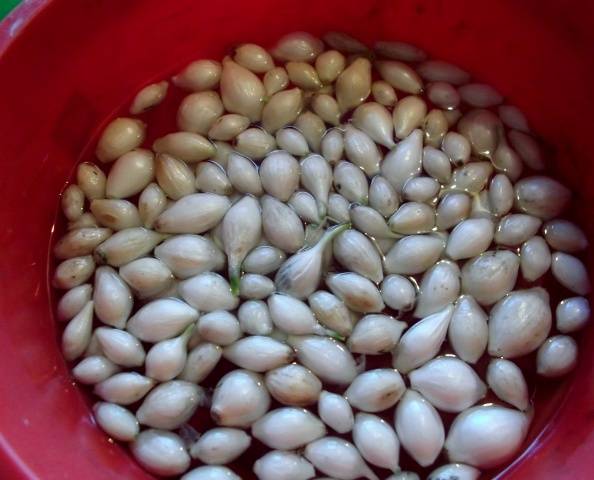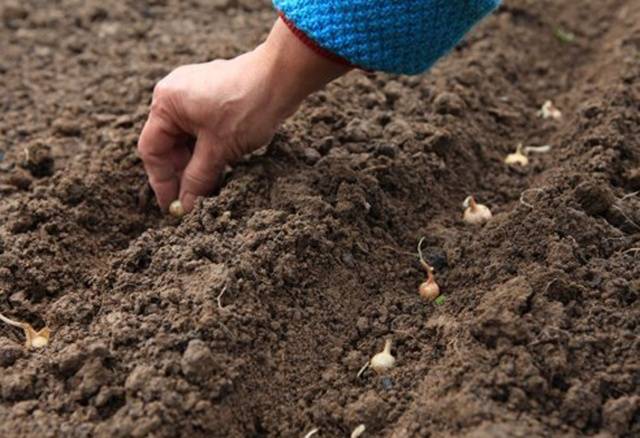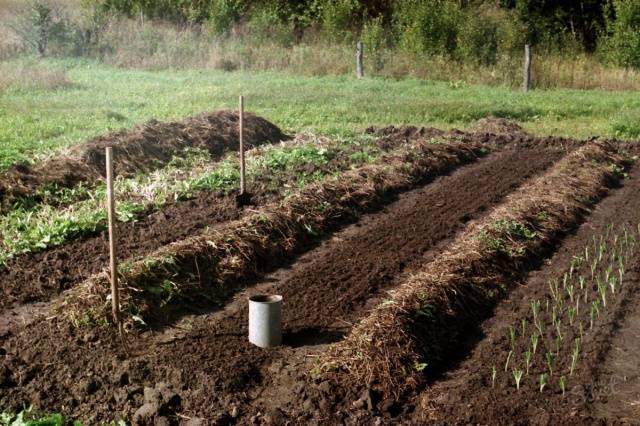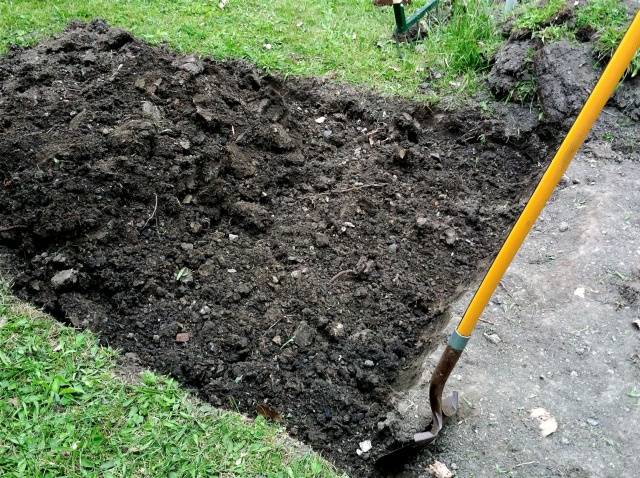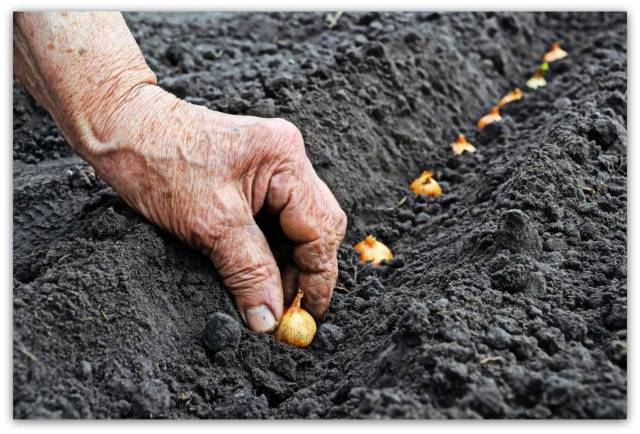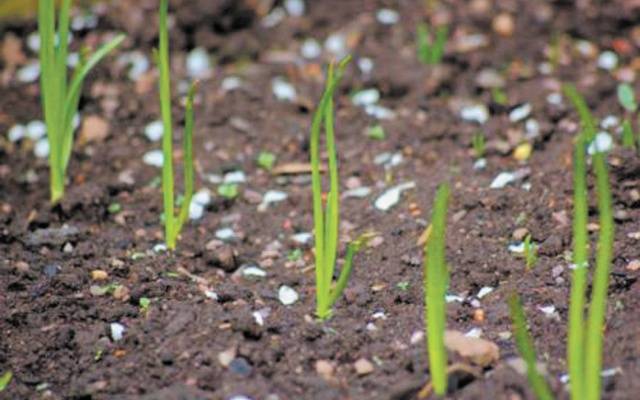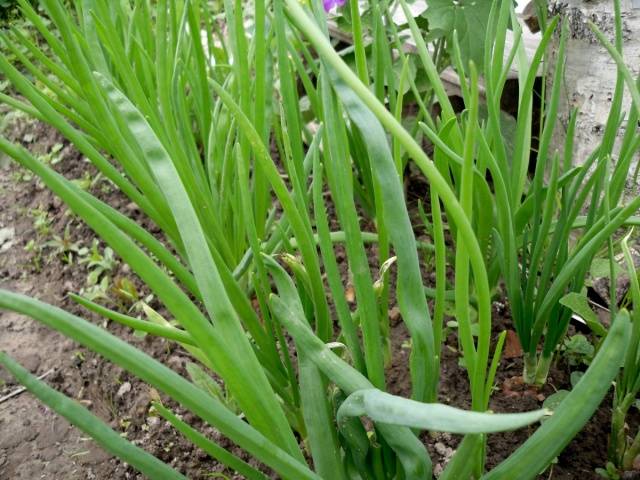Content
Planting onions in the fall before winter in the Urals allows you to reduce spring work and ensure an early harvest of this crop. For planting onions in this region, frost-resistant varieties are used that can transfer harsh winters.
Advantages and disadvantages of winter planting
Autumn planting of onions has the following advantages:
- it is quite difficult to preserve planting material until spring, especially of small sizes;
- planting work in the spring decreases;
- getting an early harvest;
- the opportunity to use the beds in the summer, freed from winter onions, under greens or early ripening vegetables;
- winter crops are weeded less often, since the first shoots appear immediately after the snow, and the onions have time to grow to active distribution weeds;
- obtaining large bulbs;
- until mid-May, watering of the soil is not carried out, in which moisture remains for a long time.
Planting onions before winter has its drawbacks:
- lower yield than when planting bulbs in spring;
- it may be difficult to store the crop.
The decrease in winter onion yield is due to the fact that some bulbs do not withstand cold conditions. With temperature changes, high humidity and winter frosts, the culture may die. Therefore, you need to be especially careful about to the choice of varieties of onions for planting in the winter.
Variety selection
For planting in the Urals, frost-resistant varieties of onions are chosen that can withstand a significant drop in temperature. This includes hybrid varieties that can grow on short to medium daylengths. The seed is divided into three groups:
- oatmeal with bulb sizes less than 1 cm;
- sets with sizes from 1 to 3 cm;
- sampling with larger bulbs.
When sowing a sample, you can get abundant greens in the spring, but you should not count on large bulbs. If you want to get onions, then choose a set. The wild oat produces medium-sized bulbs and feathers in the spring. In winter, the following varieties of onions are planted in the Urals:
- Shakespeare... One of the most common varieties suitable for portable planting. Its bulbs are large and round. Due to its dense husk, the variety is able to withstand low temperatures. Shakespeare onions ripen in 75 days.
- Radar... Another good winter variety that tastes great. Due to its high germination rate, the Radar produces a large harvest.
- Ellan... A variety of short daylight hours with rounded bulbs, golden husks and a sweetish aftertaste. The harvest is removed in June.
- Sturon... It features elliptical bulbs that ripen in three months. You can store such onions for 8 months.
- Senshui... Early ripening variety, resistant to low temperatures. The bulbs rarely form arrows and are stored for a long time after harvest.
- Red Baron... Medium early red onion variety, unpretentious to climatic conditions. It has a pungent taste and a long shelf life.
Landing dates
Onions in the Urals are planted in September. Then the bulbs will have time to take root before the onset of cold weather, but the sprouts will not have time to take root. Disembarkation is made at least a month before the onset of cold weather. Even in the Southern Urals, snow may fall in early October, so it is better not to delay planting work. Time, when to plant onions before winter, depends on the ambient temperature. If its value for several days is +5 degrees, then it's time to start work.In any case, you need to focus on the weather conditions.
It is not recommended to start planting earlier than the time. In warm weather, the bulbs will shoot arrows and will not be able to survive the frost. If you plant the onion later, then without rooting it will freeze in winter.
Preparation of planting material
Before planting in the ground, the bulbs are treated to improve their germination. It is necessary to carry out the necessary measures 10 days before the start of planting work. Processing is carried out using one of the following solutions:
- Saline solution. You can use any type of salt: coarse or fine fraction. One tablespoon of salt is enough for a liter of water. The bulbs are dipped in the resulting solution for 5 minutes.
- Copper sulfate. This substance has disinfecting properties and prevents the spread of fungal diseases. A tablespoon of copper sulfate is taken per liter of water. The onion holding time is 5 minutes.
- Potassium permanganate. On its basis, a solution of a saturated pink color is prepared. It is allowed to process the material twice: first in a saline solution, then in potassium permanganate.
In addition to the listed options, the onion is treated with Fitosporin before planting. It is a universal preparation for the prevention of plant diseases. A teaspoon of Fitosporin is dissolved in a liter of water, after which the bulbs are immersed in the solution for 15 minutes.
If the onion is grown for a turnip, then you do not need to trim its neck. For planting onions before winter, 30% more material is taken than during spring work. The sevok must be dry, without any damage or signs of deterioration.
Choosing a landing site
A good harvest of onions can be grown in sunny areas, but the culture tolerates shade well. The soil should be fertile, breathable, and neutral.
The best precursors for onions are cereals, cabbage, corn, cucumbers, and tomatoes. After the onion, you can plant almost any vegetable crop. Re-planting of onions in the garden is done only after 3 years. To avoid the spread of pests and diseases, onions are not planted after legumes, potatoes, celery and clover.
You can plant cabbage, beets, carrots, tomatoes and greens near onion beds. But it is better to refuse planting peas and beans in the immediate vicinity of onions.
Soil preparation
Timely fertilization helps to improve the quality and structure of the soil. However, you first need to disinfect the soil with a solution of copper sulfate. A tablespoon of the drug is taken for 10 liters of water. The consumption of the product is 2 liters per square meter.
Then they move on to fertilizing. For one square meter of beds, you need to prepare a nutrient mixture. It includes:
- humus - 3 kg;
- peat - 5 kg;
- potassium salt - 15 g;
- superphosphate - 20 g.
After harvesting the previous culture, the beds need to be dug to a depth of 10 cm. Then a deeper digging is performed with the introduction of fertilizers. When the dates for planting onions are approaching, ash is scattered on the garden bed (up to 10 g per square meter). The beds are equipped with a height of up to 15 cm. The optimal length of the beds is 1 m, and the width is 0.5 m. Preparations begin a couple of weeks before the start of planting work, so that the soil has time to settle.
If the soil is heavy enough, then the creation of beds is a mandatory step. This ensures soil warming and improved air exchange.If the soil is light enough and warms up quickly, then you can make low beds or abandon their equipment. Soil with high acidity is subjected to liming. Each square meter requires up to 0.7 kg of lime. After the procedure, the onions are planted only after two years.
Landing order
The procedure for planting winter onions varies depending on the purpose of growing them. If you need to get a large turnip, then the following sequence of operations must be observed:
- On the prepared beds, grooves are made with a depth of 5 cm.A distance of 15 cm is left between them.
- Dry bulbs are placed in grooves every 4 cm.
- The planting material is covered with peat and humus. Planting is not watering.
- After a cold snap, the bed is mulched with sawdust, humus, fallen leaves.
When planting a bow on a feather, the order of operations changes slightly:
- In a similar way, grooves are made in the ground with a depth of 5 cm.A 15 cm is left between the rows.
- The bulbs are placed close to each other so that in the spring the plant directs its forces to the growth of greenery.
- The plantings are covered with peat and humus.
- Sawdust, tree leaves, and tops of harvested crops are used as a mulching layer.
Family onions have small bulbs, but they are appreciated for their early maturity and high taste. Since this variety produces shallow seedlings, it is planted with the help of seeds. Family onions are planted in August or September. The order of work is as follows:
- First, the seeds are placed in water for 3 days, which is changed three times a day.
- In the beds, furrows are made 1 cm deep.Up to 20 cm is left between the rows.
- The seeds are lowered into the furrows, after which the soil is compacted.
- By the onset of frost, a socket appears, which is left for the winter.
Mulching plantings is a must-have procedure that will help the culture survive the harsh Ural winters. It is not recommended to use polyethylene film as mulch, since it does not provide air and moisture exchange. Usually in the winter in the Urals a lot of snow falls, which is an additional protection against freezing of the ground. To make the snow cover longer in the garden, you can make another layer of spruce branches or branches.
Taking care of onions after planting
In the fall, after planting and sheltering, the beds do not require additional care. In the spring, after the snow melts, the mulch layer is removed to ensure that the soil warms up. When growing onions on a turnip in the spring, the seedlings are thinned out. Leave about 5 cm between the bulbs.
In the process of culture growth, additional thinning is performed. So that the plants do not interfere with each other, up to 15 cm is left between them, depending on the variety.
In the spring, it is better to refuse feeding, otherwise the active growth of greens will begin, and the turnip will remain small. Further care of the onion consists in weeding, loosening and watering. The soil should not dry out, it is left moderately moist.
When growing onions on a feather in the spring, its active feeding is carried out. For irrigation, a fertilizer is prepared based on mullein or preparations containing nitrogen. This procedure ensures the formation of green mass.
The use of agricultural canvas helps to protect seedlings from spring frosts. This material allows sunlight and oxygen to pass through, retaining heat.
Conclusion
The onion planting process includes several stages, which include processing the bulbs, arranging the beds and applying fertilizers. The deadlines for the work must be respected so that the bulbs have time to adapt and prepare for winter. After planting, the onion does not require maintenance; it is enough to apply a mulch layer when it gets cold.In the spring, it is removed and the crop is looked after in the usual way: watering, loosening the soil and removing weeds.
